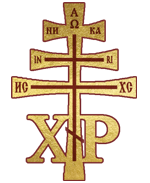A Bishop is a senior/high-ranking cleric the United Roman-Ruthenian Church that holds the fullness of the Priesthood of Christ. They may be Bishops Ordinary (otherwise known as Diocesan Bishops), Auxiliary Bishops in a Diocese, titular bishops (of a defunct See), or Capitular Bishops of the Patriarchal Chapter. Bishops may only be approved for Consecration by the Prince-Bishop as Supreme Pontiff.
Bishops hold Apostolic Succession, a direct lineage tracing back to the original Twelve Apostles. In the United Roman-Ruthenian Church, this Apostolic Succession is Catholic, Greek Orthodox, Russian Orthodox, Syrian Orthodox, Coptic Orthodox, and Armenian Apostolic, tracing back to the Apostles Peter, Andrew, Thomas, Bartholomew, and Thaddeus. By doctrine, bishops possess the full priesthood given by Jesus Christ, granting them the authority to ordain other clergy, including consecrating other bishops.
The term "bishop" derives from the Greek word "epískopos," meaning "overseer." While the term was not exclusive to Christianity, it soon became a central part of the early Christian church's organizational structure. As the Church expanded, new bishops were appointed to oversee churches in important cities, while smaller congregations were served by officials known as chorbishops. Over time, the role of the bishop evolved from leading a single urban church to overseeing a larger geographical area.
Throughout history, bishops have also exercised political authority within their dioceses, often serving as civil administrators and statesmen in addition to their religious duties. This trend was more pronounced in the Western church, where bishops took on significant civil responsibilities as the Roman Empire's authority waned. In the Eastern churches, the involvement of bishops in secular affairs was generally less extensive. In the Holy Roman Empire, the Archbishops of Mainz, Köln, and Trier were Prince-Electors of the Empire and held significant power, including as temporal rulers of their own territories. Those three Electorates are maintained today as part of the United Roman-Ruthenian Church's titular patrimony.
Return to Main Page

Pontifical Imperial State
of Rome-Ruthenia
United Roman-Ruthenian Church